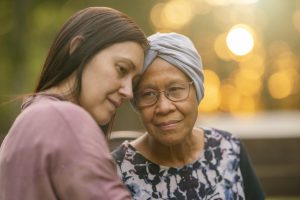 If a friend or loved one is displaying symptoms of confusion that occur or worsen in the late afternoon and evening, they may be experiencing sundowning, also known as sundown syndrome.
If a friend or loved one is displaying symptoms of confusion that occur or worsen in the late afternoon and evening, they may be experiencing sundowning, also known as sundown syndrome.
Sundowning is typically characterized by problems with memory, thinking, reasoning, and mood regulation which present themselves through behaviors such as pacing, wandering, or closely following someone, in addition to more dramatic outbursts of yelling, crying, or violence. A person experiencing sundowning may suffer from paranoia, delusions, or insomnia, as well. Although these symptoms usually occur in the latter half of the day, they can also appear during the morning.
Over 20% of people diagnosed with Alzheimer’s and other forms of dementia suffer from sundown syndrome. The exact causes of sundowning are unknown, but physical discomfort, infections, sleep cycle disruptions, overstimulation, and low lighting can all worsen its symptoms.
Managing triggers is the best way to prevent or decrease the severity of sundowning episodes. Light therapy, music therapy, and familiar environments can also help. Additionally, antidepressant, anti-anxiety, or antipsychotic medications may provide relief in some cases. For people whose sundowning symptoms are linked to sleep-related triggers, melatonin can be used to help restore a normal sleep cycle.
It’s important to get a loved one suffering from sundown syndrome to a doctor as soon as possible and to advocate for them throughout the treatment process to ensure that any issues they can’t communicate on their own are identified promptly. Schedule an appointment at Jamaica Hospital Medical Center’s Ambulatory Care Center now by calling (718) 206-7001.
All content of this newsletter is intended for general information purposes only and is not intended or implied to be a substitute for professional medical advice, diagnosis or treatment. Please consult a medical professional before adopting any of the suggestions on this page. You must never disregard professional medical advice or delay seeking medical treatment based upon any content of this newsletter. PROMPTLY CONSULT YOUR PHYSICIAN OR CALL 911 IF YOU BELIEVE YOU HAVE A MEDICAL EMERGENCY.
